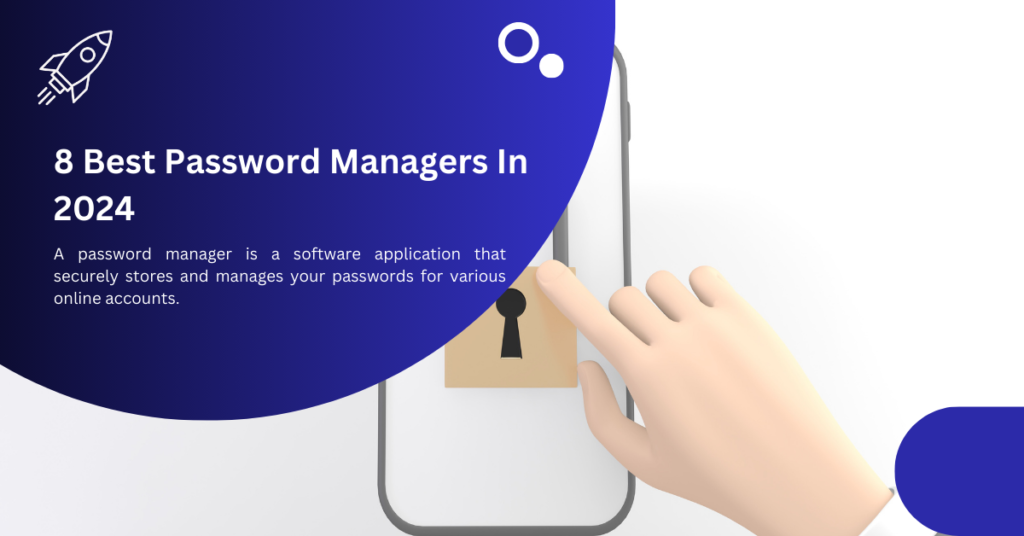A password manager is a software application that securely stores and manages your passwords for various online accounts. It eliminates the need to remember multiple passwords and helps you create strong, unique passwords for each account, significantly improving your online security.
Here are some key features of password managers:
- Password storage: Securely stores your passwords in an encrypted format, making them inaccessible to unauthorized users.
- Password generation: This helps you create strong and unique passwords for all your accounts.
- Automatic login: Automatically fills in your login credentials on websites and applications, saving you time and effort.
- Secure sharing: Allows you to securely share passwords with others if needed.
- Multi-device access: Access your passwords from any device, including computers, smartphones, and tablets.
- Data breach monitoring: Alerts you if any of your accounts are involved in a data breach.
8 Best Password Managers
Here are the best password managers in 2024 according to our experts:
1. Norton Password Manager
2. NordPass
3. Dashlane
4. Bitwarden
5. 1Password
6. KeePass
7. Keeper
8. LastPass
1. Norton Password Manager Review
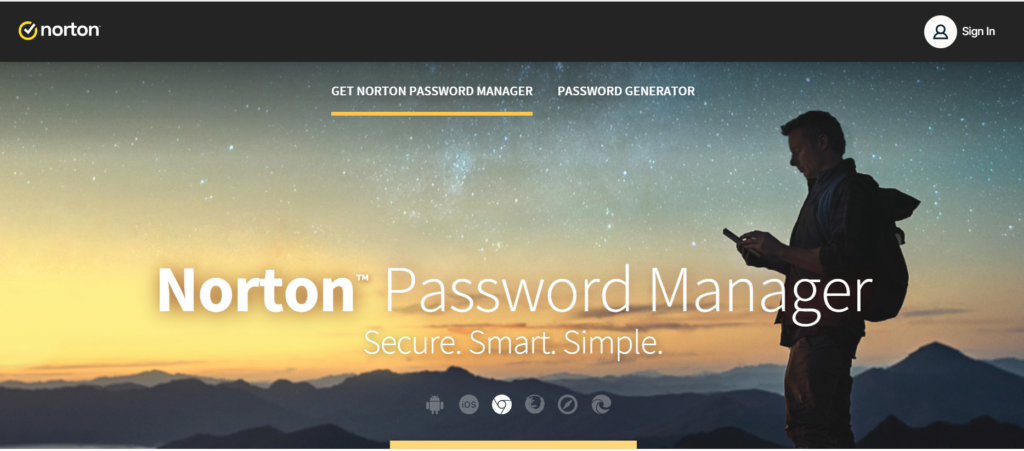
The Norton Password Manager is a secure and easy-to-use password manager that stores and manages all your passwords in one place.
Pros:
- Free: One of the few feature-rich password managers entirely free of charge.
- Unlimited storage: Store an unlimited number of passwords and personal details.
- Easy to use: User-friendly interface with simple navigation and features.
- Basic features: Covers the essentials like password storage, generation, and autofill.
- Mobile app: Manage passwords on the go with the Android and iOS apps.
- Integration: Integrates with other Norton security products for a comprehensive solution.
Cons:
- Limited features: Lacks advanced features like secure file sharing, dark web monitoring, or password inheritance.
- Basic security: Security details and protocols are less transparent compared to competitors.
- Autofill issues: Users have reported occasional issues with autofill functionality.
- Limited browser support: May not work seamlessly with all browsers, especially Safari.
- Data ownership: Terms of service raise concerns about Norton’s access to user data.
2. NordPass Review
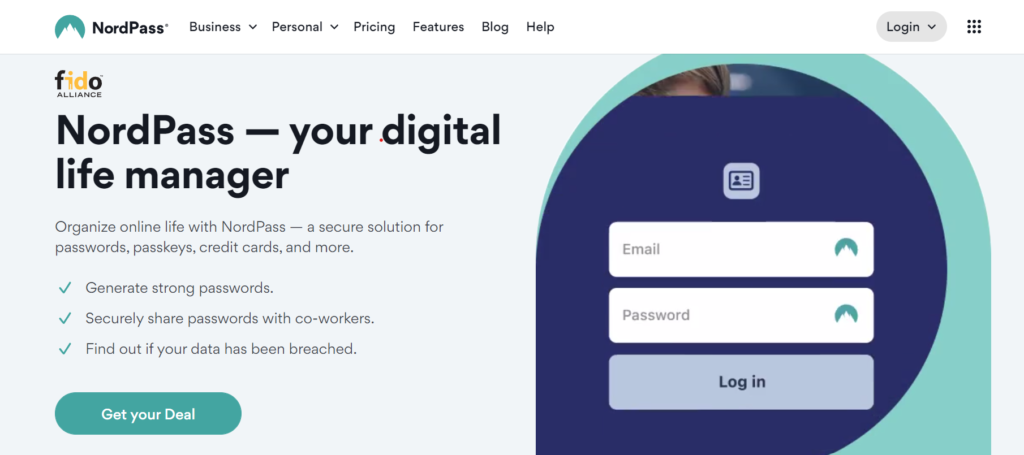
NordPass is a password management solution offered by NordVPN, a well-known provider of virtual private network (VPN) services. Here’s a review based on information available including pros and cons.
Pros:
- User-friendly: Intuitive interface with clean and modern design.
- Strong security: Uses XChaCha20 encryption and zero-knowledge architecture for maximum security.
- Cross-platform: Available on all major platforms, including Windows, Mac, iOS, and Android.
- Affordable: Competitive pricing with a free plan and premium plans offering additional features.
- Data breach scanner: Monitors for potential data breaches and compromised passwords.
- Password health checker: Analyze the strength and security of your existing passwords.
- Emergency access: Share emergency access to your vault with a trusted person.
- 2FA support: Supports two-factor authentication for added security.
Cons:
- Lacks some advanced features: Compared to competitors like 1Password and Dashlane, NordPass lacks features like secure file sharing and dark web monitoring.
- Inconsistent autofill: Some users have reported issues with autofill functionality on certain websites and browsers.
- Limited password-sharing options: Sharing passwords with other users is limited and can be cumbersome.
- No password inheritance: Unlike some competitors, NordPass does not offer a password inheritance feature.
3. Dashlane Review
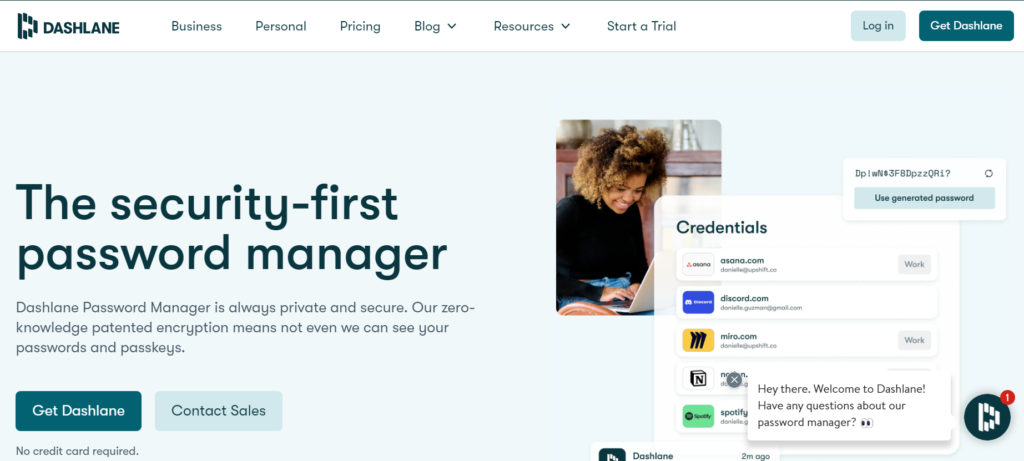
Dashlane is a popular password manager and digital wallet application designed to help users securely manage their passwords, personal information, and online payments.
Pros:
- Comprehensive feature set: Includes password storage, generation, autofill, secure notes, dark web monitoring, VPN (premium plans), ID theft protection (premium plans), and family plan options.
- User-friendly interface: Clean and intuitive design with easy navigation.
- Strong security: AES-256 encryption, zero-knowledge architecture, and multi-factor authentication ensure data protection.
- Cross-platform: Available on all major platforms, including Windows, Mac, iOS, and Android.
- Automatic password changer: Helps update passwords across multiple sites instantly.
- Secure document storage: Store important documents, IDs, and financial information securely.
- Dark web monitoring: Alerts you if your personal information is found on the dark web (premium plans).
- VPN: Encrypts your internet traffic for added security and privacy (premium plans).
- ID theft protection: Monitors for signs of identity theft and assists in case of incidents (premium plans).
- Family plan: Securely share passwords and manage family accounts easily.
Cons:
- Pricing: Free plan is limited, with premium plans being more expensive than some competitors.
- VPN limited to premium plans: Basic features not included in the free plan.
- Data breach monitoring limited: Only monitors your email address (free plan) and personal information (premium plan).
- Sharing features are potentially complex: Sharing options can be confusing for some users.
4. Bitwarden Review (2024)
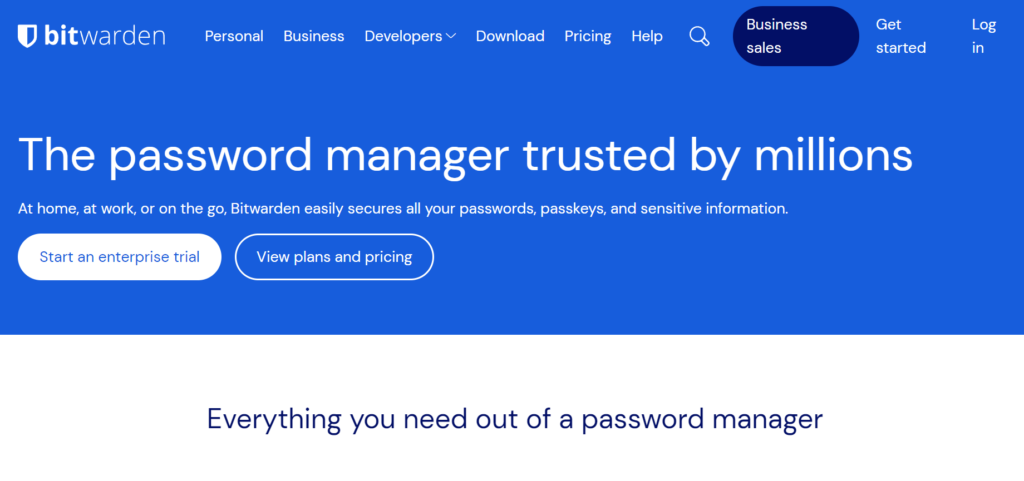
Bitwarden is a free and open-source password manager that encrypts your passwords and stores them securely in the cloud. Bitwarden is available on a variety of platforms, including Windows, macOS, Linux, Android, iOS, and Web. It also offers a browser extension for Chrome, Firefox, Safari, and Edge.
Pros:
- Open-source: Transparent and community-driven development ensures strong security and accountability.
- Free plan: The generous free plan includes unlimited passwords, devices, and secure sharing.
- Strong security: Uses modern encryption algorithms and zero-knowledge architecture for data protection.
- Cross-platform: Available on all major platforms, including desktops, mobile devices, and web browsers.
- Advanced features: Premium plans offer password strength audits, secure file storage, encrypted notes, and priority support.
- Self-hosting option: For maximum control and privacy, users can self-host their Bitwarden vault.
- Password inheritance: Share your vault securely with trusted individuals in case of emergencies.
- Local-only mode: Store essential data offline for added security, even without internet access (premium plans).
Cons:
- Less user-friendly interface: The Interface may appear less polished compared to some competitors.
- Limited free plan features: Features like password strength audits and secure file storage require premium plans.
- Lacks some advanced features: Compared to competitors like Dashlane, Bitwarden lacks features like dark web monitoring or VPN integration.
- Technical knowledge required for self-hosting: Setting up and managing self-hosted vaults requires technical expertise.
5. 1Password Review
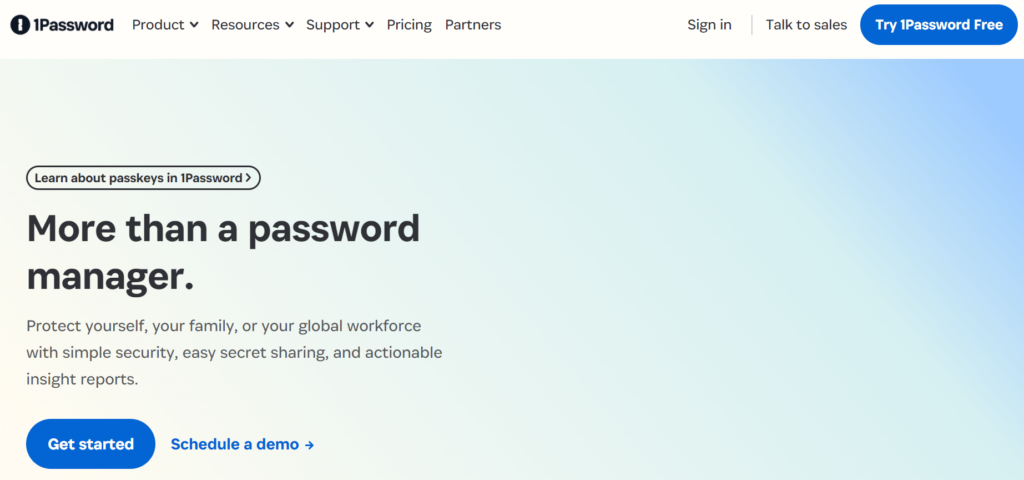
1Password is a highly regarded password manager that provides users with a secure way to store, manage, and access their passwords and other sensitive information.
Pros:
- Strong security: Uses industry-leading encryption and security practices, including zero-knowledge architecture and biometric authentication.
- User-friendly interface: Clean, intuitive design with easy navigation and organization options.
- Cross-platform compatibility: Available on all major platforms, including desktops, mobile devices, and web browsers.
- Powerful features: Covers essentials like password storage, generation, autofill, and secure notes. Offers additional features like travel mode, data breach alerts, and family plans.
- Security dashboard: Provides comprehensive insights into your password health and potential vulnerabilities.
- Secret Key: Unique security layer adds an extra level of protection beyond your password.
- Travel Mode: Temporarily removes sensitive data from your local devices for enhanced security during travel.
- Family plan: Securely share passwords and manage family accounts easily.
Cons:
- Pricing: More expensive than some competitors, with no free plan available.
- Limited data breach monitoring: Only monitors email addresses in the free trial, premium plans cover additional information.
- No built-in VPN: Unlike Dashlane, 1Password doesn’t have a VPN integrated into its premium plans.
- Limited file storage: Free trial and individual plans offer limited file storage compared to some competitors.
6. KeePass Review
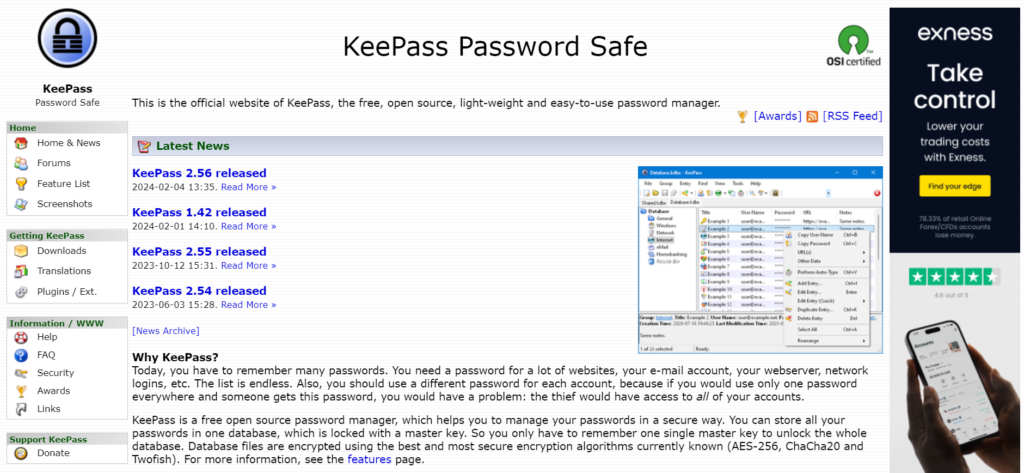
KeePass is a password manager that allows users to store their passwords, usernames, and other sensitive information securely in an encrypted database. It is available for Windows, macOS, Linux, and other operating systems, and it can be used offline without requiring any cloud-based storage.
Pros:
- Completely free and open-source: No subscription fees and full transparency in code and security practices.
- Highly customizable: Offers extensive customization options for power users and security enthusiasts.
- Strong security: Uses AES encryption and supports two-factor authentication for robust protection.
- Portable: KeePass database files can be stored on any device or cloud storage for access anywhere.
- Plugins: Expand functionality with a wide range of community-developed plugins.
- Local data storage: No data stored on third-party servers, enhancing privacy control.
Cons:
- Steep learning curve: Not as user-friendly as some competitors, requiring more technical knowledge for setup and use.
- Lacks modern features: Misses out on features like automatic form filling, secure sharing, and data breach monitoring present in other options.
- No mobile app: The official mobile app is limited in functionality, requiring third-party alternatives with security concerns.
- Potentially vulnerable to user errors: Manual configuration can lead to security risks if not done properly.
7. Keeper Password Manager Review
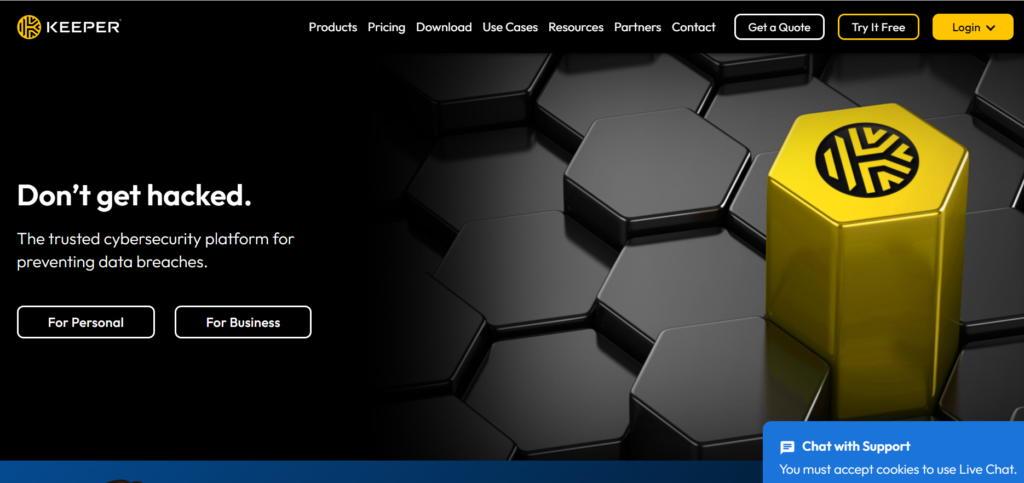
Keeper is a widely used password manager and digital vault designed to securely store and manage passwords, sensitive files, and other private information.
Pros:
- Strong security: Uses AES-256 encryption and zero-knowledge architecture for data protection.
- Multi-factor authentication (MFA): Supports various MFA options like fingerprint, Face ID, and security keys for added security.
- Advanced features: Offers features like secure messaging, encrypted file storage, dark web monitoring, and breach alerts.
- Business-oriented features: Provides team and enterprise plans with user management, access controls, and compliance tools.
- Cross-platform compatibility: Available on all major platforms, including desktops, mobile devices, and web browsers.
- User-friendly interface: Modern and intuitive design with easy navigation and organization options.
Cons:
- Pricing: More expensive than some competitors, with no free plan available.
- Feature bloat: The abundance of features may overwhelm some users who only need basic password management.
- Limited data breach monitoring: Free plan only monitors email addresses, premium plans offer broader coverage.
- Not open-source: Code and security practices are not open-source, raising potential transparency concerns for some users.
8. LastPass Review
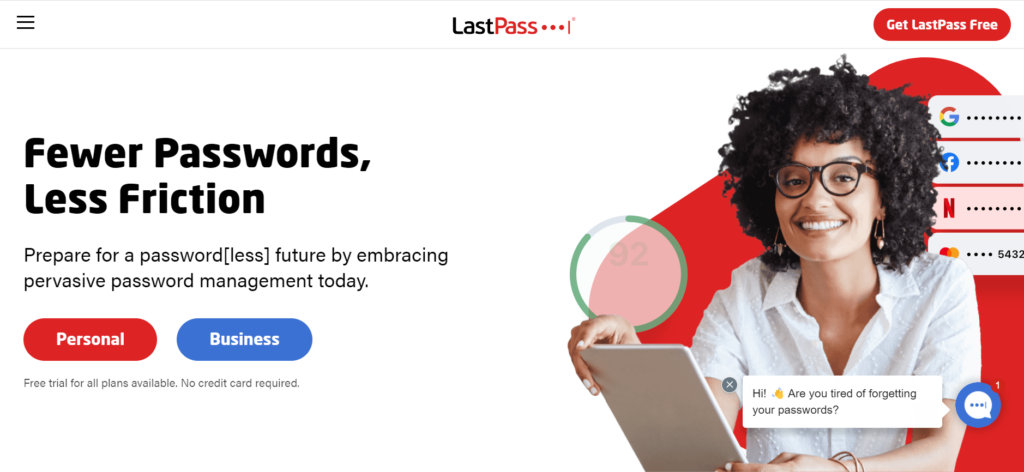
LastPass experienced significant data breaches in 2022, raising concerns about its security posture. While the company took steps to improve security, some users feel uncomfortable trusting them hence the need to proceed with caution and consider alternative options if security is not guaranteed.
Pros:
- Free plan: Offers basic password storage and management for individuals.
- User-friendly interface: Clean and intuitive design with easy navigation.
- Strong features: Paid plans include password sharing, secure notes, dark web monitoring, and emergency access.
- Cross-platform compatibility: Available on all major platforms, including desktops, mobile devices, and web browsers.
Cons:
- Recent data breaches: Two major breaches in 2022 compromised user data, raising security concerns.
- Closed-source: Code and security practices are not transparent, unlike Bitwarden.
- Limited free plan: Lacks features like dark web monitoring and secure notes compared to competitors.
- Pricing: Premium plans might be less competitive compared to other options.
Ultimately, the decision depends on your priorities
- If security is your top concern: Consider alternatives like Bitwarden or 1Password due to their recent security track records.
- If features and affordability are important: LastPass might be an option if you understand the security risks and are comfortable with them.
- If business-oriented features are crucial: Keeper remains a strong contender.
Remember, data security is paramount when choosing a password manager. Weigh the pros and cons carefully and do your research before making a decision.
Why is password security important?
Password security is incredibly important for several reasons:
Protecting sensitive information: Your passwords act as the gatekeepers to your online accounts, which often contain sensitive information like financial data, personal documents, communication records, and even health information. A weak or compromised password can grant unauthorized access to this information, leading to significant harm.
Preventing identity theft: Hackers often target weak passwords to gain access to personal information, which they can then use to steal your identity. This can involve opening fraudulent accounts, making unauthorized purchases, or even damaging your credit score.
Combating malware and spam: Many malware and spam campaigns rely on stolen passwords to spread or gain access to your devices. Strong passwords make it harder for such malicious actors to succeed.
Maintaining online safety: Weak passwords weaken the overall security of online systems, making them more vulnerable to attacks. Strong passwords contribute to a more secure online environment for everyone.
Here’s how good password security benefits you:
- Peace of mind: Knowing your information is protected by strong passwords reduces stress and anxiety about online security.
- Financial protection: Prevents financial losses due to unauthorized access to accounts.
- Reputational protection: Guards against identity theft and its damaging consequences.
- Privacy protection: Ensures personal information remains confidential.
What makes the best password manager?
The best password manager typically has the following features:
1. Strong Encryption: A password manager should use strong encryption to protect your data from hackers and other unauthorized access.
2. Multi-Factor Authentication: It should support multi-factor authentication, which adds an extra layer of security to your accounts.
3. Autofill Functionality: The password manager should have an autofill feature to automatically fill in your login credentials when you visit a website.
4. Cross-Platform Support: It should support multiple platforms such as Windows, Mac, iOS, and Android.
5. Cloud Sync: The ability to sync your passwords across devices via cloud storage is crucial.
6. Password Generator: A password manager should also have a password generator feature that creates strong and complex passwords for you.
7. User-Friendly Interface: The interface should be easy to use and navigate, even for non-technical users.
8. Customer Support: Good customer support is essential in case you encounter any issues with the software.
Best Password practices
- Use strong, unique passwords for each account. Avoid common dictionary words, your personal information, or easily guessable patterns.
- Enable two-factor authentication (2FA) whenever possible. This adds an extra layer of security by requiring a second verification step beyond your password.
- Consider using a password manager. These tools help you create and manage strong passwords securely.
- Be cautious about phishing scams. Never share your passwords with anyone or enter them on suspicious websites.
By taking password security seriously, you can significantly reduce the risk of online threats and protect yourself, your information, and your loved ones.
How do password managers work?
Password managers offer a secure and convenient way to store and manage your login credentials across various online accounts. Here’s how they work:
Core principle
- Encryption: The heart of password security lies in encryption, which transforms your passwords into unreadable code using a strong algorithm. This ensures even if someone accesses your password database, they cannot decipher the actual passwords without the encryption key.
- Master password: You use a single, strong master password to access your encrypted vault of passwords stored within the password manager.
Typical functionalities
- Password generation: Most password managers help you create strong, unique passwords for each account, eliminating the need to reuse or remember complex combinations.
- Autofill: With browser extensions or apps, password managers automatically fill in login credentials on websites, saving you time and effort.
- Secure storage: Your passwords are stored in an encrypted vault within the password manager, shielded from unauthorized access.
- Synchronization: Many password managers sync your vault across multiple devices, ensuring consistent access on all your gadgets.
- Additional features: Some offer advanced features like secure note storage, dark web monitoring, and even two-factor authentication integrations.
Two common types of password managers
1. Local password managers
- Store your encrypted password vault on your local device, either on your computer or phone.
- Pros: Offer complete control over your data, no dependency on external servers, and potentially more secure against online attacks.
- Cons: Inaccessible if your device is lost or damaged, requires manual backups, less convenient for multi-device access.
- Examples: KeePassXC, Dashlane (with local storage option).
2. Cloud-based password managers
- Store your encrypted password vault on the provider’s secure servers, accessible from any device with an internet connection.
- Pros: Convenient multi-device access, and automatic backups, often offer additional features like dark web monitoring.
- Cons: Relies on the security of the provider’s servers, potential privacy concerns depending on data collection practices, requires internet access for most features.
- Examples: 1Password, LastPass (despite recent breaches), and Bitwarden.

